Is My Baby Developmentally Ready to Start Solid Foods? with Amy Manojlovski, RDN
- What signs to look for that your baby is ready to eat
- Why your baby doesn’t need to start solids too early, even if they are big or small
- How to assess if your baby is sitting relatively well enough to start solid foods
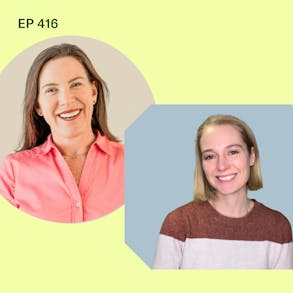
LISTEN TO THIS EPISODE
Episode Description
What are the signs that your baby is ready to start solid foods? What if your baby isn’t sitting up at 6 months, is it ok to do purees? Or what if you think your baby is ready EARLY even though they’re not 6 months yet?
About the Guest
- Amy Manojlovski, RDN is a Dietitian and Early Intervention Specialist; she’s a mom of 3 and former NICU dietitian.
- Amy works in Early Intervention with babies who have 30%+ fine or gross motor skill development delay.
Links from this Episode
- Follow Amy online at https://happylittletummies.com/
- Baby-Led Weaning with Katie Ferraro program with the 100 First Foods™ Daily Meal Plan, join here: https://babyledweaning.co/program
- Baby-Led Weaning for Beginners free online workshop with 100 First Foods™ list to all attendees, register here: https://babyledweaning.co/baby-led-weaning-for-beginners
Other Episode Related to this Topic

Latest Episodes
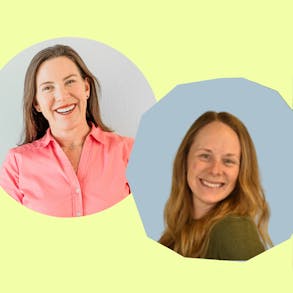
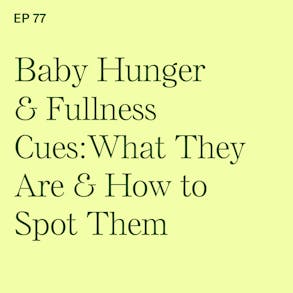
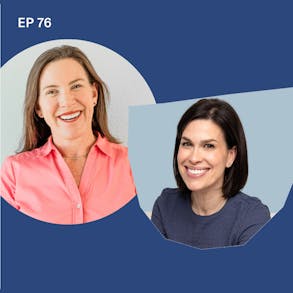
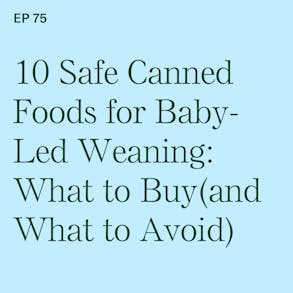
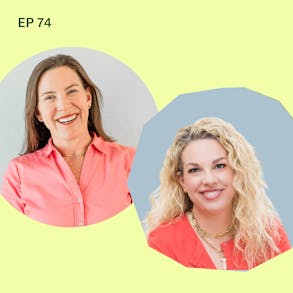
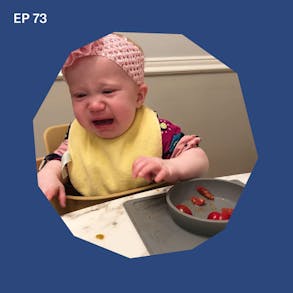
2 (2m 24s):
There are so many Instagram out there that it's showing these perfect meals and these perfect ways to feed babies. And that's not how most babies look. We have this idea of getting kids to do things. We have to let them do what they're gonna do on their timeframe and we need to support them. We can help the parents stay calmer and say, don't worry about that right now. We just need to work on hand to mouth right now. Don't worry about volume.
1 (2m 48s):
Hey there. I'm Katie Ferraro, Registered dietitian, college nutrition professor and mom of seven specializing in Baby-Led Weaning. Here on the Baby-Led Weaning with Katie Ferraro podcast. I help you strip out all of the noise and nonsense about feeding, giving you the confidence and knowledge you need to give your baby a safe start to solid foods using Baby-Led Weaning. What are the signs that your baby is ready to start solid foods and are all babies even really ready right at the six month mark? I mean, what if your baby isn't sitting up yet but your doctor tells you to start? Or what if you think your baby's ready early, which is generally before six months of age?
1 (3m 29s):
So there are lots of developmental things that are going on for your baby around the six month mark, and that's generally when we start thinking about starting solid foods. But there's also a lot of variation between babies and not all babies are moving at the same developmental pace as one another. My guest today knows a lot about developmental readiness. She works almost exclusively with infants in feeding. Her name is Amy Manojlovski and she's a Registered dietitian and an early Intervention Specialist. So Amy is a mom of three. She's a former NICU dietitian and she's licensed in the state of Illinois, which is where she practices. So Amy works in the early Intervention program and the babies that she works with have at least a 30% delay in their fine or gross motor skill development.
1 (4m 10s):
And this is important because what Amy does for her job is she helps families identify where the delays are and then provides them with the skills that they can use to then help get their baby's nutrition back on track. So I wanted to interview Amy to have her help us understand a bit more about the developmental changes that our babies are going through as they get ready to start solid foods. And in particular, I wanted to pick her brain around strategies for parents for when they get external pressures to start solid foods too early. So whether that's grandma saying, oh, that baby is hungry, or he needs food, or maybe a pediatrician who's pushing for starting cereals or purees prior to six months. Amy is going to explain about typical versus atypical milestone achievements prior to starting solid foods.
1 (4m 53s):
She's gonna also share a particularly challenging case that she worked on recently where her and the speech language pathologist that she partners with, they had to help navigate a cow's milk protein allergy for a baby. And then she's gonna alleviate any fears you might have over your baby, "not getting enough or not eating enough". And then what do you do if those feelings do start to creep in after you've made that transition to solid foods. So with no further ado, here is Amy Manojlovski talking about Is My Baby Developmentally Ready to Start Solid Foods.
2 (5m 24s):
Well thank you for having me. I'm so excited to be here.
1 (5m 26s):
I have heard so much about you from Jill Rabin. I actually got to meet her in person recently. She's a speech language pathologist who's been on our show a number of times. She's also feeding therapist and a lactation professional. And she told me a lot about the work that you guys do together and your specialty area is in pediatric nutrition. So could you tell us just a little bit about your professional background and then how you came to do the line of work that you do in early intervention?
2 (5m 52s):
Sure. So I'm a Registered dietitian. And I have been a dietitian for about 23 years, almost 24 years. So I've been in this for a long time. And I graduated and did your normal route of going into the clinical setting in a hospital. And I was there for many years. And while there I got a little bit of a taste of pediatrics at the beginning. And then one time I got to work and I was given the pediatric floor as my new floors to cover. And if you're a dietitian, you kind of know how that works. You get told where to go and you start working on those floors. So I worked in Pediatrics for about five years exclusively and fell in love with it. I loved working with the parents, I loved working with the nurses and the team approach.
2 (6m 34s):
It was a little different than maybe working on a surgical floor or something. And I really enjoyed that. And I did do NICU work too. I, I covered the NICU when the NICU dietitians were gone. Then I decided to stay home with my little girl. She was about 18 months when I decided to stay home with her and I was home for about a year. And during that time I was always kinda looking for that next thing to do. And my husband mentioned that early intervention program in Illinois hires dietitians. And he heard about it from a friend of his who works with orthotics through early intervention. And so I was able to become credentialed in early intervention and it has been the best decision I ever made.
2 (7m 14s):
I, you know, I have to give credit to my husband for pushing me to, to get all the signatures and all the paperwork I needed to start an early intervention and that has been just a Godsend and I've been in early intervention now for 15 years and working every day.
1 (7m 27s):
And could you tell us what early Intervention entails and is it the same in every state?
2 (7m 32s):
No. So it's much different in every state. And, it looks different on paper, it looks different on the way that the therapists actually come into the home. So early intervention is a program that's preschool and it's getting kids ready to go into the school system. And it is an amazing program. It's a 0 to 3-year-old program. And so once kids hit 3 years old, then they would go into the school system if they need additional support. So for children who are coming that have prematurity or they have medical concerns, even just developmental concerns, they can be recommended by their pediatrician, they can be recommended by a social worker or just parents alone can reach out to the early intervention program provider and ask for an evaluation.
2 (8m 19s):
Any child, 0 to 3 year old is eligible to have an evaluation no matter what the reasoning is.
1 (8m 26s):
Besides prematurity, like I know my quadruplets were born were in California and they were born premature. So they qualified for high risk early intervention up until age 3. And I loved it 'cause we would go to UC San Diego and all of the, the research people were there and you could just ask all of your questions. It was so interesting. And then after three they kind of like aged out of it. And I was always curious what things other than prematurity would have had allowed a family to qualify for those same services.
2 (8m 53s):
So you have to, in the state of Illinois, you have to have a 30% delay in one of the main areas which will be speech motor, which is fine motor and gross motor skills, And, I, think those are the main three areas. And then we have developmental, which is an overview of all those to put together.
1 (9m 11s):
And who determines what. Like a 30% delay is like, you'd have to have your pediatrician refer you?
2 (9m 16s):
Your actual therapist who's evaluating that person. So the professional that's in that degree gets to make that decision. And they are the professionals who are the experts. And so if a physical therapist is coming in to see your child, they have their own state approved evaluation tool that they will use that will give a percentage that the state then uses to decide whether the child would end up in program or not.
1 (9m 42s):
I know that you work primarily with infants and I'm just curious what sort of diagnoses or conditions do the babies that you work with, like what do they have or what are they experiencing?
2 (9m 51s):
So a lot of them have feeding challenges that might be breast feeding challenges, that might be just oral motor feeding challenges. Those are those two main challenges in the 0 to 12 month range. Then we also have low weight or slow weight gain is a large one. I see a lot of kiddos with down syndrome and they are automatically qualified for the program. So if you have a child who has down syndrome, you know they should be automatically referred to the early intervention program in your state. But if they're not, please get them in there. And then anyone with a tube feed or tube feeding concerns, I see a lot of those and those I love my tube feeding kids. And, I love helping parents get their kids off of tube feedings.
2 (10m 33s):
And then also for kiddos that might just have feeding concerns in motor wise, right? Like they cannot self feed, they'll pull me in to make sure that the kids are getting an adequate nutrition.
1 (10m 44s):
When you say babies that have feeding challenges, are you seeing like pediatric feeding disorder as a diagnosis and that's how they come into your ecosystem or is it like a pediatrician catching it and say, "Hey, this doesn't look typical", you should go see early intervention. Who defines what a feeding challenge is.
2 (11m 1s):
So often it is the pediatrician. We also have parents who will self refer. Their kids just aren't eating like they, you know, their first child was easy and now this one's really difficult. The pediatricians will also, they do those ASQs in the office and sometimes that's gonna be the flag that has kids go into the EI program or get referred to their, and then it's often on a lot of parents self-report, right? My child is not doing X, Y and Z. But I will say often that feeding piece is combined with other things. The child's not walking, the child is having some fine motor concerns. And then in those interviews with the parents, we find out that there's feeding concerns too.
2 (11m 42s):
So that feeding concern might not be the first thing that gets them in there, but we definitely wanna catch it and we definitely wanna address it once they're in.
1 (13m 14s):
Amy, can you talk a little bit about developmental readiness for starting solid foods? Like what does that look like in a typically developing infant and how might that change for a baby, let's say with down syndrome?
2 (13m 25s):
So you know, we're really looking, you know, Katie, you've had wonderful podcasts about that developmental piece and we're looking for those same things. We're looking for motor to have that strong motor base, being able to sit by six months old to be able to stay at midline, which means that the head stays straight because that makes the safest swallow. So if the child is kind of slouched over in their chair, that's not gonna be a safe swallow. So we either have to support their head and their neck in some way, or we need to hold off on starting solids. We wanna see if a child can do that hand to mouth mean that they're bringing toys to their mouth already. They're able to have that nice shoulder girdle support to be able to use their arms and then of course to make sure they're safe to swallow that medical piece.
2 (14m 8s):
Some of our babies need to be checked on that before we can start solids. The one thing about early intervention is we are not a medical provider, we are a developmental provider. So if a child is having swallowing issues, we are not the ones that are allowed to advance their diet, it has to go through the hospital feeding therapist and the dietitian there and then we take those orders that they get discharged with and then we get to work with those.
1 (14m 32s):
I know of your work, as I mentioned, I met you through Jill Rabin, she's well known in the infant feeding world for her adapted Baby-Led Weaning approach and she does work with infants and children who have feeding challenges and down syndrome. So she's an SLP and a feeding therapist. I know she recommends you so highly and I think it's so wonderful that she gets to work with you daily. You guys, it sounds like you work on almost all of your cases together. I was curious if you could just give us an example of a particularly challenging feeding case that both you and the speech language pathologist. So, dietitian and SLP have worked on together just to kind of give an idea of how this interdisciplinary approach should work when children have feeding challenges.
2 (15m 9s):
Yeah, so I, when you asked this question, I was thinking about like we have so many kiddos that we've really had great success with and I joke because Jill likes to put me out of a job with her Baby-Led Weaning as I start with them and then I get to discharge. But one of the ones I was thinking about is a little boy who I met when he was four months old. A lovely, lovely family and he had some significant medical history. So he was born with down syndrome, which was diagnosed after birth. He had a duwan eritrea, which is when the bowels are not orally formed or there's a stricture in there or a blockage that requires immediate surgery after birth.
2 (15m 51s):
So he was born with that, he also was diagnosed eventually with a floppy airway, which makes it hard to breathe. And he had an NG tube placed after that first surgery. So Jill was in there first working on the pre feeding skills. He was able to drink by mouth but he wasn't able to support himself with that. I came in at four months old, Jill brought me in onto the team and we started working on those NG tubes and actually it was G-tubes by the time I got there. He had just had a G-tube placed a couple weeks before, which was, we really encouraged parents to think about that if it's gonna be long term so we can work with that feeding piece and the oral motor piece without having a tube in there.
2 (16m 32s):
So Jill kept working with those pre feeding skills and then I started working with mom about getting him on a, you know, a really typical infant schedule around that five, six months. Then Jill started with solids when he was motorically ready and, I'd have to look back in my notes to see when that was. But in all of this also he had a milk protein allergy that was diagnosed. That was diagnosed, but then later on it became what we call FPIES. So he was vomiting for multiple weeks.
1 (16m 59s):
Oh My gosh.
2 (17m 1s):
Even I know, I mean you would not believe this history if you saw this kid today, like I went back and looked at this history, And I was like, oh my gosh, like he had this and this and like oh my gosh, like this is what this kid had, this kid is thriving now. So he had the FPIES with to dairy and that was diagnosed and so mom kept dairy out of his diet. But if anyone on this listening to this has a child with FPIES, it can be very scary to continue to introduce foods into your kid.
1 (17m 31s):
Oh yeah. And we actually have a whole episode that we did with Marion Groetch on FPIES. So I'll link to that in the show notes because if you have delayed vomiting longer than two hours after ingestion of the suspected food, you do wanna consider FPIES. Although I do just wanna point out that it's incredibly rare and what we hate to hear is parents learn a little bit about FPIES and then every time their baby throws up they're like, oh my gosh, it's FPIES. Like you definitely need to be working with a qualified credentialed feeding expert to help diagnose this. So you're in that system, this baby has FPIES on top of everything else,
2 (18m 1s):
Right? so we just, this mother and the father we're so good with continuing to move forward with food and they're from Mexico so they just had all these wonderful ethnic foods in this child's diet and Jill just really worked hard on that handout, self-feeding, and he was able to get off the G-tube. He was able to transition to, I believe they did ripple in the cup, which is a pea protein milk. They kept dairy out of his diet, he thrived, I discharged him once, he was like two because he was just doing great and he continues, he's now, I just was looking, he's like three and a half, he'll be four this year and he is thriving. No, no obviously needs for tube feedings and he is eating amazing.
2 (18m 46s):
He is on Jill's Instagram.
1 (18m 48s):
And one reason I love talking with individuals like yourself who really work with children with feeding challenges is that the schedule might look different. But as a dietician specializing in Baby-Led Weaning, I'm a firm believer that with the exception of an exclusively tube fed child, all other children have the capacity to learn how to feed themselves and they have the right to learn how to do that. But oftentimes their timeframe will look different than a typically developing child. And it's important that they're working with a credentialed expert. And that's where I see, like I spend a lot of time on social media and we see unfortunately a lot of parents being misled. They said, well I saw on this Instagram account that like down syndrome babies can do Baby-Led Weaning, the timeline just looks different. And I'm like, oh my gosh, no it doesn't.
1 (19m 29s):
Like there's very involved therapy that's happening behind the scenes there. The timeline does look different and there's all of these different professions who are involved. Not all, but I mean the SLP, the dietitian, the occupational therapist, there's no one individual who's qualified to help a child with down syndrome for example, learn how to become an independent eater. so we have a lot of dietitians and SLPs and OTs feeding therapists who listen to this show. Could you just share a little bit about your thoughts regarding interdisciplinary approach for starting solid foods for babies with feeding challenges?
2 (20m 2s):
I think it's imperative. I really do. I feel like, you know, I know my portion of helping a child develop and that is making sure they're getting nutrients, making sure that they're getting enough calories for all the hard work that they have to do in feeding and their motor. But I am not an oral motor expert, so I need that oral motor expert on there. And, I need someone to make sure they're, you know, I can look at a child in a high chair and make sure in my visual to see if they're placed right. But I love having that PT physical therapist come in and make sure that they are supported and they can order the right chair for them or they can, you know, so we need an inter, and that's why EI to me is the perfect way to work with a child in a feeding capacity because I do have access to all these.
2 (20m 50s):
And the last piece of this puzzle is a social worker. Sometimes when we have a child who's having a lot of feeding issues, there's a lot of other things going on because we work with parents and sometimes it doesn't all line up. So yeah, I also, early Intervention also offers social work opportunities and so we, we sometimes even pull them in. so we would have a really large inter interdisciplinary team working with children.
1 (21m 14s):
And I, just want add on to your answer there that yes you say, oh I need the PT, I need the SLP, they need you. I take offense or issue when my parents come to me and say, oh and you know, the SLP is feeding therapist that I'm working with gave me this prescription for this many grams of protein. I was like, excuse me. Like that's completely out of their wheelhouse. Like we were saying, we don't sit here and talk about, you know, motor planning and rotary chewing. We work together with our colleagues who specialize in that. But the Registered dietitian I believe should play a much larger role in infant feeding in the clinical healthcare setting than than they currently do. And that's why I'm just fascinated to be able to talk with you because there's not a lot of early intervention dietitians out there. I mean in the state of Illinois, how many EI dietitians do you think there are?
1 (21m 54s):
Like if you had to ballpark it.
2 (21m 56s):
We are a big state. I know down state I am actually doing a vs for them down there because they don't have dietitians to do the eval. So and I mean that's 400 miles from me. I mean 25, 50, I don't know,
1 (22m 8s):
It's wild, wild. It's so important. I think there's so much room for growth in the world of pediatric nutrition because there's certainly such a need for it and I'm really grateful for the other disciplines who, who recognize that as well. So Amy, parents you know this, they get a ton of external pressure to start solid foods early. So family members will say things like that baby's hungry, he needs food, or your breast milk isn't enough, you should start cereals. And for parents of babies who are not yet six months of age and who are not yet demonstrating the reliable signs of readiness to eat, what are your suggestions for these parents on how to handle that pressure?
2 (22m 41s):
So I really tell them to stay strong. I give them the information about how I really like gut health and I'm a very big advocate of of helping the gut to, to be as strong as possible. So I just explain to parents the gut's not ready for solid food yet before six months. And so, you know, so many people are worried about allergies and and different things and so I just said, let's let that gut get as strong as possible before we start introducing foods into it. And I know you have some great allergy podcasts too about that. And then really there's no science to starting before six months. There's no benefits to it. So I really encourage them to wait to for six months and especially if they are gonna do adaptive Baby-Led, we need, they might need to even wait a little bit longer than six months and make sure their baby is safe as possible before starting solids.
1 (24m 46s):
Kind of in closing here, if there's one thing that you want parents to walk away from today, having learned about developmental readiness to start solid foods from a nutrition standpoint, what is that?
2 (24m 56s):
I loved your comment about it's gonna look different for everyone and that is one thing that I feel is so important for parents to understand. I love your Instagram and your podcast because it is so spot on, but there are so many Instagram out there that it's showing these perfect meals and these perfect ways to feed babies and that's not how most babies look. And I want parents to think, you know, I, I did a presentation a few months back. And, it was entitled, Letting Go of the Get, right. And we always have, even for professionals, we have this idea of getting kids to do things. We need to get kids to do this and get kids to do that and I think and and Baby-Led, we need an adapted Baby-Led. We the kids are the the main people that are doing this.
2 (25m 37s):
We have to let them do what they're gonna do on their timeframe and we need to support them. And as dietitians, if they're a little slower in getting to that end line, then we need to look at how can we support parents? Do we need to do a little extra supplementation? Do we need to do, you know, whatever it is we need to do. That's why the dietitian can be so helpful because we can help the parents stay calmer and say, don't worry about that right now. We're gonna let them. We just need to work on hand to mouth right now. Don't worry about volume. Letting parents know that it's gonna look different for everyone and then get support when you feel like you need it. You're not alone.
1 (26m 11s):
Amy, I've so enjoyed this conversation, thank you so much for your time and sharing your expertise. Where can our audience go to learn more about early Intervention and in particular the work that you're doing in your state?
2 (26m 22s):
So depending on what state you're in, you can definitely go, I'm sure there's an early intervention webpage, so I would definitely go to that. And then your, your pediatrician should be a very good resource for your early intervention program and your state. And if you'd like to know more information about me, I do have a website. It's happylittletummies.com. I am licensed in Illinois. I do see private clients but I have to stay in Illinois.
1 (26m 46s):
Well thank you so much. It was great chatting with you.
2 (26m 50s):
Thank you.
1 (26m 50s):
That was Amy Manojlovski, Dietitian and Early Intervention Specialist. She's online at happylittletummies.com and I'll link the resources that she mentioned in the description below, but also on the show notes that you can find at BLWpodcast.com/416. A special thank you to our partners at AirWave Media. If you guys like podcasts that feature food and science in using your brain, check out some of the offerings from AirWave. We are online at BLWpodcast.com. Thank you so much for listening and I'll see you next time.

The Program Baby-Led Weaning with Katie Ferraro
A step-by-step digital program for starting solid foods safely and navigating the original 100 FIRST FOODS™ meal plan with baby-led weaning.
 EXPERT-LED, PROVEN APPROACH TO EATING REAL FOOD
EXPERT-LED, PROVEN APPROACH TO EATING REAL FOOD CONCISE VIDEO TRAININGS TO MASTER BABY-LED WEANING
CONCISE VIDEO TRAININGS TO MASTER BABY-LED WEANING 100 FIRST FOODS DAILY MEAL PLAN WITH FOOD PREP VIDEOS
100 FIRST FOODS DAILY MEAL PLAN WITH FOOD PREP VIDEOS
Baby-Led Weaning for Beginners Free Workshop
Is your baby ready to start solid foods, but you’re not sure where to start? Get ready to give your baby a solid foundation to a lifetime of loving real food…even if you’re feeling overwhelmed or confused about this next stage of infant feeding.
Get baby-led weaning recipes and tips delivered to your email inbox.

